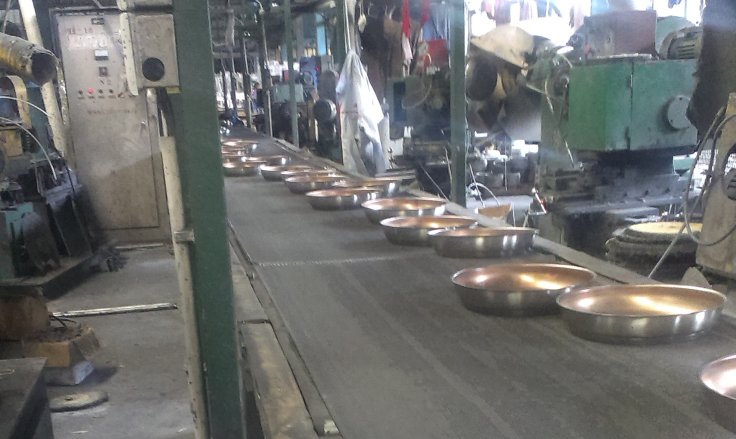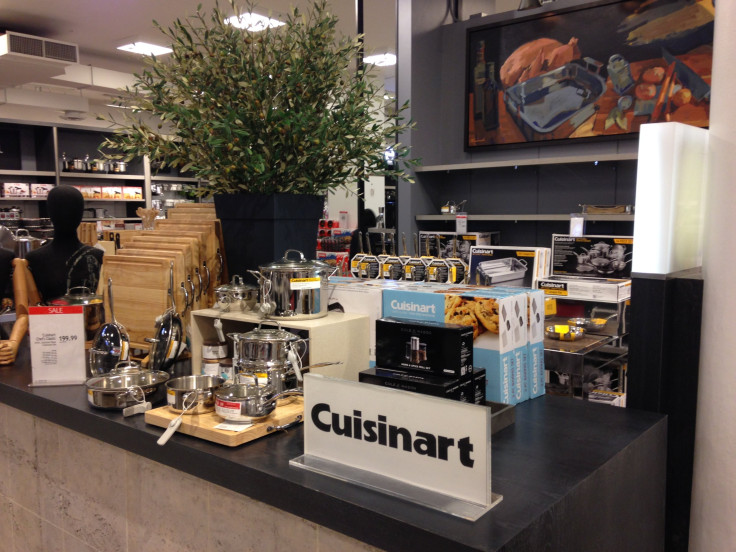Chinese Cookware Factories Rife With Abuse And Low Pay: Report

At some of its stores in the United States, popular retailer IKEA sells stainless steel frying pans at around $20 a pop. Thousands of miles away in the southeastern Chinese province of Guangdong, workers earned as little as 6 cents for each one of the products they churned out, a report states.
According to an investigative report released Thursday by China Labor Watch, Chinese cookware factories that supply name-brand Western retailers like Walmart, IKEA, Carrefour, Macy’s and Kohl’s are plagued by low pay, labor violations and poor working conditions. The study from the New York City nonprofit relies on undercover investigations carried out in five Chinese factories from March to June of last year.
“These abusive practices are utilized as cost-cutting measures to maximize profits for factories and, in turn, multinational buyers at the expense of workers,” China Labor Watch said in a statement.
Chief among the abuses charged is the so-called piece-rate wage system. At four of the five factories named in the report, workers have no guaranteed pay. Instead they’re compensated by how many goods they produce. Once a mainstay of American businesses like textile and clothing manufacturing, industrial-level piecework is widely regarded as exploitative today.
“You’re passing off any seasonal costs of doing business to labor,” said Kevin Slaten, program coordinator at China Labor Watch. “It creates a high-pressure environment.”
Piecework is legal in China. But depending on how much workers are compensated, the system risks violating minimum wage laws, especially during periods of low demand. On top of that, at each of the five factories featured in the report, workers were not given mandatory overtime pay.
The report also highlighted dingy housing conditions, rough working conditions and major safety risks. Factory managers often failed to provide adequate ventilation systems or proper safety equipment, according to the investigation. “That’s not only a breathing risk but it’s a fire hazard,” Slaten said.
In 2014, aluminum dust accumulation at a General Motors supplier in Kunshan City, near Shanghai, sparked an explosion that killed at least 146 people.
Under the regime at Ri Xing Stainless Steel Products — a company that supplies Walmart, Macy’s, Kohl’s and IKEA, among others — workers signed blank labor contracts, leaving management to fill out crucial items like wage rates and working hours, according to the report. Workers there allegedly earned around $400 a month, the sum of piecework that ranges from six to 14 cents per item.

Walmart did not immediately deny any of the allegations. “We are aware of the report and are reviewing the findings and will take action as appropriate,” said spokeswoman Marilee McInnis. “We care about the men and women in our supply chain, and we have standards for suppliers and a responsible sourcing program in place to help identify violations of those standards.”
IKEA said it could not identify any links to one of the two suppliers China Labor Watch tied to the corporation. Nevertheless, spokeswoman Mona Liss said the company “takes the report very seriously and our own ongoing investigations and actions in the matter has the highest priority. Improving working conditions and securing workers’ rights is an important part of IKEA’s ongoing focus.”
“If the findings are verified to be correct, this is a breach of our supplier code of conduct and consequently totally unacceptable,” she added.
Cuisinart, Carrefour, Kohl’s and Macy’s did not respond to requests for comment.
International Business Times spoke with shoppers in the kitchenware department at Macy’s flagship New York City location about the report’s findings.

“I’m not surprised,” said Maureen Duke, 29, as she browsed the knife selection with her fiancé Josiah Guitian, 29. The two said they recently bought an American-made broom at Target, gladly choosing quality over cost. “You can tell [by the price] if it’s made in a place where they pay workers a decent wage,” said Guitian.
Mercedes Pena from the Bronx was eyeing a pressure cooker set for $119.99. Speaking in Spanish, Pena said hers had recently broken. When asked about the China Labor Watch report, she commented on the department store’s going rates for pots and pans. “It’s abuse,” she said. “They get the work for cheap and they sell it for a lot.”
Pena acknowledged it’s unlikely to have much effect on her cookware buying patterns, though. “If you need to buy it, you need to buy it.”
© Copyright IBTimes 2024. All rights reserved.





















